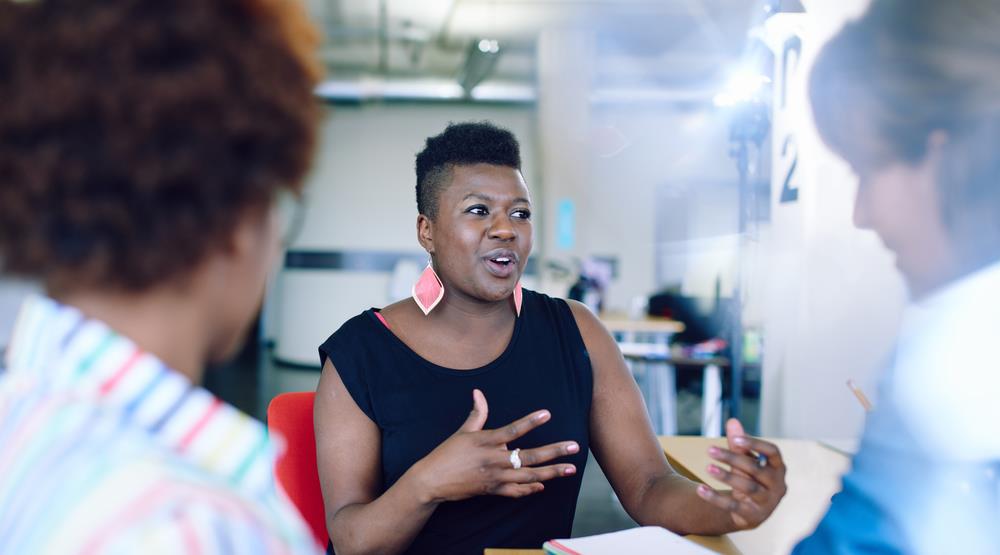- Job Seeker Resources
- |
- Last Updated: July 13, 2021

How to Prepare for a Panel Interview (and Sample Questions)
You finally got the call you've been waiting for and landed an interview – congratulations! But suppose you've accepted an invitation for a panel interview. In that case, you might be asking yourself, "What exactly did I just agree to?" If so, we're glad you're here.
Let's start with the burning question: "What is a panel interview?" A panel interview is a meeting with your potential employer that will consist of two or more team members, often from different departments and rankings of the organization. Panel interviews can occur in-person or virtually, but in both settings, you'll be asked questions by each panelist.
Typically, panel interviews are held later in the recruiting process – when the hiring manager wants to introduce finalists to other company stakeholders and get additional input to make a hiring decision. However, panel interviews are becoming more common throughout the hiring process for a number of reasons.

For example, panel interviews may be conducted when the role you've applied for is a highly collaborative one, or when the employer wants to see how you fit in with the company culture. It could merely be that scheduling one time for everyone involved in the hiring process to meet a potential candidate (you!) is most convenient for them.
The fact of the matter is, preparing for a panel interview isn't much different than planning for a one-on-one interview. However, a few key steps can help you feel more confident about being interviewed by multiple people at one time.
If you want to impress everyone on the board, heed these six pieces of advice on how to prepare. For an added sense of security, we encourage you to read, review, and come up with your own answers to the sample panel interview questions that follow.
1) Treat it like any other interview.
In other words, don't skip out on the steps that are crucial to making any interview a successful one. Start by researching the company, thoroughly reading through the job description, and making notes of keywords that relate to your skills along the way. Jot down questions that you want to ask, and most importantly: Dress for success. Of course, if it will be a virtual meeting, stick to the standard video interviewing best practices.
2) Organize your thoughts ahead of time.
During a panel discussion, you're likely to be thrown a lot of different questions from different people, and it can become overwhelming. Suppose you take notes ahead of time on some of your key qualifications and skills that relate to the job (those keywords we mentioned earlier). In that case, you'll be more likely to remember them on the spot. It would be best if you thought about experiences and examples you want to share to advocate for yourself and keep the meeting conversational.
3) Aim for a conversational feel.
Though sometimes it might feel more like an interrogation setting, think of your panel interview as a professional networking event where you simply talk to a group of people. Don't leave anyone left out of the conversation and try not to pick favorites. Make eye contact with everyone in the room while you answer questions, not just the person who asked. Try to address each panelist at least one time, and be sure to call them by name.
One good practice is to refer back to something another panelist said earlier. For example, "Earlier, Bob, you mentioned that the marketing team often collaborates with the sales team to promote new products. As the product manager, what has been the most exciting project that you've worked on together?" The ability to refer back to people is why it's crucial to follow our next pointer.

4) Research all panelists and their roles.
Do your due diligence in finding out who you're meeting with and their department, role, and responsibilities with the company. An excellent place to start digging could be the "Staff" section of the company website, or LinkedIn profiles. When it comes time to interview, you'll be able to direct any questions you have to the appropriate manager or team member. It can also help you figure out what types of questions you should anticipate based on who's attending and from what department. If you absolutely can't find that information ahead of time, you'll want to follow this next one.
5) Bring a notepad and pen.
No better tool can help you remember everyone's names, roles, and responsibilities in the room. Contrary to some belief, there's nothing rude about taking notes during an interview (in most cases). It shows that you care about retaining what everyone is saying, and it will keep you from losing your train of thought. A notepad is also a great place to store questions that you may want to ask later in the interview. Even in this age of technological advancements, we still advise against taking notes on a cell phone or other electronic device.

6) Have enough copies of your resume and cover letter.
This tip should go without saying, but not showing up with enough copies is an interview “fail” that has stood the test of time. Another reason why it's essential to know who you are meeting with that day is so that you can be sure you come prepared with enough copies. You should have one copy of your resume and one copy of your cover letter ready for each panelist, along with a few extras. It's better to have too many than not enough – you never know who might pop into your meeting last minute!
Common Panel Interview Questions & How to Answer Them
Now, the moment you've been scrolling for: common panel interview questions and how to answer them.
Q: What accomplishment are you most proud of?
A: Briefly outline the situation, and then talk about the positive outcome.
"During my sophomore year in college, I knew that I wanted to do something to make a difference. I came up with a game plan to help give back to seniors within the community. I was able to bring together a large group of people for the volunteer project where we delivered groceries and meals to the elderly. Within one year, we were able to assist over 150 residents. I was even given recognition in the local newspaper."
Q: What differentiates you from other candidates in this industry?
A: Explain how your background relates to the qualifications they are looking for.
"One thing that sets me apart from other candidates is my ability to communicate with people. In my previous role as an IT technician, I would meet with customers face-to-face. Those experiences taught me a lot about customer service and what it takes to make conversations effective. This quality gives me an edge over other candidates since most tech-focused roles are behind the scenes. As a team lead for your company, I can combine my years of experience in the industry and my ability to communicate to help the team perform better."
Your next great opportunity awaits.
Q: What do you know about this company?
A: Be sure to reference specific facts you found while doing your research.
"I've known about your company for quite some time, but I was reading on your website that ABCompany is one of the largest marketing firms in the metro area. I read an article in your blog section about how you work with multiple Fortune 500 companies, which I found intriguing. I follow you on social media, and I always enjoy the "Trivia Tuesday" posts you share. In my last role, I would often look at your company's marketing tactics because ABCompany is such a leader in the industry. That's why I was excited to apply for this role when I saw your post about it on Facebook."
Q: What attracted you to this position?
A: Point out how the position specifically aligns with your goals, and what is unique about the role.
"In my next position, I'm highly interested in expanding my skills in the construction industry. I reviewed the job description and saw an emphasis on how you encourage your employees to further their education, so it seemed like a great fit. Since I've already spent over 10 years in the field, I can take courses to earn niche qualifications that ABCompany is looking for."
Q: How would your colleagues describe you?
A: Think about 2 to 3 traits one might use to describe you, and be honest. Briefly explain why a colleague might characterize you that way, and provide a quick example to back it up.
"My colleagues have told me that they appreciate my dependability, punctuality, and helpfulness. On multiple occasions, I have offered to work overtime to help my team members with projects. I also hate to be late, so they would probably tell you how I am always the first one in the office and the first to start a fresh pot of coffee."
We hope this helps you to approach your upcoming panel interview with confidence. And remember – practice makes perfect. No matter the outcome, think of it as a learning experience. Now get out there and impress those panelists!

March 16, 2021
Sign In or Register to access all articles and insider tips for help in your job search.
Search for iHire Jobs
RELATED JOBS
RELATED RESOURCES
Find the Right Job Faster
- Get personalized job matches sent to your inbox every day
- Connect directly with employers before your competition
- Advance your career with expert advice on interviewing, salary negotiation, and more
We value your privacy


![9 Secrets to Selling Yourself in an Interview [Premium Webinar]](https://az505806.vo.msecnd.net/cms/e2022034-75bd-46c2-a498-116796d1a9f5/4ea8f1ab-277b-4d64-8c22-148cc36b782c-md.png)

